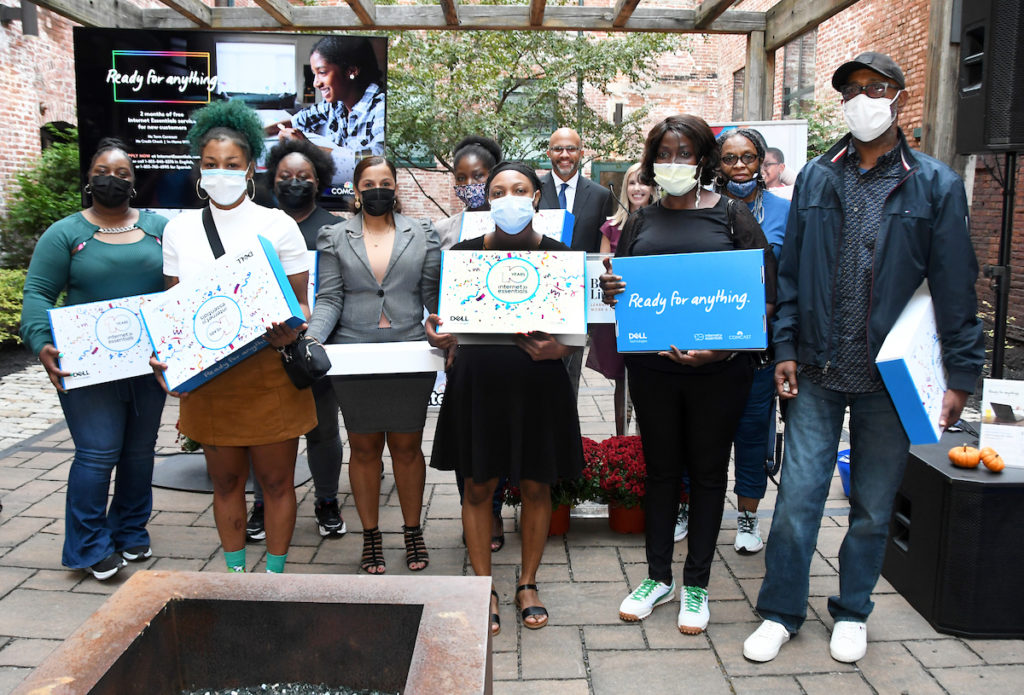Adult learners need digital literacy, too
 October 26, 2021
Category: Featured, Medium, Purpose
October 26, 2021
Category: Featured, Medium, Purpose
Disclosures
This article was originally published at our sister site, Technical.ly.The numbers are trending up: Per a summer 2021 survey conducted on behalf of the City of Philadelphia, 84% of residents have broadband connections in their homes, up from 70% in 2019.
Part of the credit for that change goes to Comcast’s Internet Essentials program, which offers discounted services to low-income households.
It’s a reminder that digital access remains indispensable, as does institutional support in boosting it.
The Center City-headquartered telecommunications giant recently celebrated the 10th anniversary of Internet Essentials by pledging an additional billion dollars over the next decade. With this program and by working with partners including adult education nonprofit Beyond Literacy, it’s working to continue to expand digital literacy in Philadelphia.
Comcast hosted an unveiling event at Beyond Literacy’s new campus at 100 W. Oxford St. in Kensington earlier this month, where it presented 1,000 free laptops and $30,000 to be split between Beyond Literacy, The Welcoming Center and SEAMAAC (Southeast Asian Mutual Assistance Association Coalition), all of which serve immigrant communities.
Bob Smith, the regional VP of community impact at Comcast, said he noticed that as eligibility for Internet Essentials expanded in recent years and now reaches not just younger students, but older adults, immigrants, refugees and adult learners, there is a need for literacy in the more traditional sense of learning to read, as well as digital literacy resources that worked in tandem.
“We had been talking about the new Beyond Literacy campus and this opportunity to celebrate both things,” he told Technical.ly. “We want to really jumpstart the work we’re doing with adult learners. There are so many segments of society that are left behind. We have to work with each of them where they are. When we first brought the idea to [Beyond Literacy CEO] Kimmell Proctor, we talked a lot about this issue over the last several weeks.”
In addition to its Kensington campus, Beyond Literacy has West Philadelphia and Center City campuses to help the organization reach its goal of educating 2,500 adults. Comcast’s aid during the pandemic has been valuable, Proctor told Technical.ly.
“Comcast has allowed us to enhance our hybrid learning model so that learners with broadband devices could quickly pivot,” she said.
According to Proctor, 30% of Beyond Literacy’s adult students reported not having access to broadband internet at the outset of the pandemic, with many only having smartphones to use for classwork that included studying for the citizenship exam. As the org adapted during the pandemic in supporting its students with remote learning, double the amount of students are now studying with the help of a broadband connection as before. Comcast helped by sharing with them information about getting connected for free through the Emergency Broadband Benefit, per a spokesperson.
Smith emphasized that the three main barriers to broadband adoption in homes are a lack of adequate devices, the cost of internet services, and a lack of tech training and education. (When describing those issues at a policy level, we’ve heard it called “digital redlining.”) He’s noticed moments such as public STEM hackathons that attracted young learners, only for those learners to hit a roadblock when going back to a school or home with no broadband access.
Proctor is optimistic about Beyond Literacy’s newest campus opening its learning labs to community members, and that with Beyond Literacy campuses spread throughout the city, there are multiple ways to engage adult learners in the community.
For Smith, literacy and digital literacy are inextricably linked. He remembered GED students learning by studying books and testing on paper, until their curriculum was eventually shifted to a digital format.
“All of these organizations had to ramp up digital literacy training skills in helping hundreds of adult learners getting GED and equivalency diplomas,” he said. “It’s wonderful for us to support that work.”
Project
Internet EssentialsTrending News











